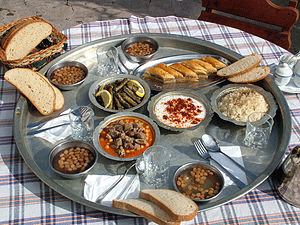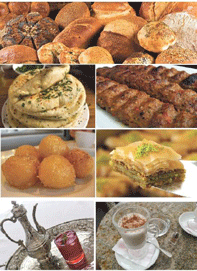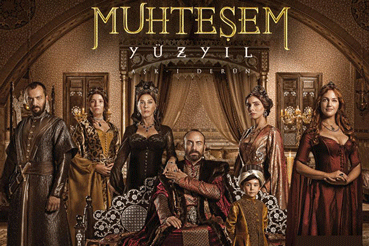By Tara Narayan
SUDDENLY I’m discovering Turkish food! That’s because belatedly all of last week I’ve been burning my eyes watching all these episodes of the Turkish television series of 2011-2014 — namely “Magnificent Century.” And I’m albeit belatedly I’ve found something so soooo thought-provoking to cheer me up. The series is amongst the other things the life and times of the various women who make up a Turkish sultan’s harem, for one thing the concubines don’t have to cook but they are fed the choicest of food cooked by men in the royal palace kitchen!
The Ottoman Empire’s Sultan Suleyman or King Suleiman, the longest ruling 10th sultan, comes across as a charismatic, poet sultan who loved women as much as he taught himself patience working on precious stone jewelry — which he presented to his various slave concubines after he finished his romantic rendezvous with them!
Two queens offer a contrasting study of women in stressful situations, by far the more interesting is his second queen, Hurrem sultan (a traumatized Russian young woman who witnessed the slaughter of her family in the Crimean war and found herself a slave at the mercy of everyone in Sultan Suleiman’s harem…here are some fascinating stories within stories about petty feminine pelf and power, intrigue and melodrama of times gone with the wind leaving behind only lessons to learn for all of us.
Sufficient here to that the Magnificent Century series is historical fiction with mirch masala to amuse, seduce and I found myself terribly seduced watching the episodes in bits and pieces late in the night, until I got the entire picture in my head. If you want to get a perspective on European’s history make time for this Turkish series, it’s educates about Turkish history, Ottoman Empire, particularly vis-à-vis-Christiandom and Islam in Europe in the medieval 14th/15th centuries. The series spins around only the 100 years of life and times during Sultan Sulayman rule, when the Ottoman empire was at the peak of its power, and then there is of course the role of women in his life who bore him his children. From the sound of it he was not a cruel forgettable sultan but quite a kind-hearted, sensitive guy despite all the scheming and manipulation going around him!

SINCE there was a quite a bit of banqueting and entertainment going on in the series I found myself wondering about the sherbet the women were constantly being treated to if they stayed in the good books of the sultan and his mother! A sherbet of fruit, flowers and herbs to keep them keep them lovely looking if not lovely in their minds.
What do I know about Turkey and Turkish food? Nothing really! I need to go to Turkey now. Mention Turkey and all that comes to mind is Turkish delight, the soft crush of fine pastry layers filled up with nuts…a classical halva of Turkey. Now I know Turkey was influenced by Greece and the other countries around even as Sultan Suleiman waged wars to bring as much of Europe as he could into his Ottoman Empire; basically he wanted control of the Mediterranean sea trade routes.
It’s the golden age of the Ottoman Empire which saw the best of feasting with banquets thrown for reasons of diplomacy, marriage alliances or birthdays or celebrations, even funerals. I learn that the famous hummus of Lebanese fame actually started out as a dip of chickpeas and cinnamon, and there’s “haz ekmek” or 46 different versions of bread made out of seeds with fennel juice added in. Boza is a boiled millet fermented drink, alcoholic and non-alcoholic.
The Turkish royalty also loved lamb stuffed aubergine and yes, there was buttermilk, the Turkish yayik aryani – salty yogurt drink, summertime refreshing tartness…so much so that in more modern times even Turkish McDonalds do packaged aryani.The traditional buttermilk version is a byproduct of fermented butter churning in skins bags or barrels; but there’s also the aryani which is just yogurt, water and salt. But the national drink of Turkey is raki or twice distilled grapes and aniseed (fancifully called “lion’s milk” and in Turkish vocabulary lion references abound, the children often referred to as lion’s cubs).

Apparently there was a lot of secrecy around what the Ottoman sultans and their harem women ate and food was always tasted beforehand to check that it was not poisoned by some enemy! An episode in “Magnificent Century” has this poisoned dessert being sent up to the sultan’s chamber (biwi number one wanted to kill biwi number two, Russian slave queen Hureem). Anyway, I’m told even today baklava and Turkish coffee make up the mainstay status of wealthy Turkish families…although one sultan had banned coffee, but the women loved it for all the caffeine helped keep them slim and trim or so one hears. Don’t forget there were also the herbal sherbet which intrigue me the most.
A bit of travelogue reading up reveals that in Istanbul today you will find much of the Turkish stuff down the streets…baklava, confectionary of a myriad kind with jams, juices, syrups and all kinds of sweet something. Baklava actually goes back in history to thousands of years to Assyrian times. But it is the 15th century Ottoman chefs who presumably perfected the art of making and serving baklava at Sultan Sulayman’s Topkapi Palace kitchen of the 1470s. The most perfect baklava must come as paper thin pastry layered with honey and nuts. It’s an expensive treat for the ordinary Turkish people.
THEN of course Turkish cuisine influenced by the cuisines of the surrounding kingdoms conquered feature a dazzling array of kabab (lamb being a favorite meat) grilled on iron blades, now they have the famous doner kabab and we see the vertical rotisserie in some places in Goa too. Borek sound very much like our samosa but the Turkish fat crescent beauties come with savoury meaty stuffing and also dried fruit
Also think of the various pilaf of Turkish and Persian fame, can’t tell who influenced whom but the Turkish people love their pilaf cooked in lamb broth and I do believe they rival the Persian pilaf. The hallmark of the perfect pilaf being that they may not be sticky but wildly aromatic loose rice affairs teasing the taste buds forever after. Pilaf was the staple of the Turko-Mongolian people and the Persian city of Tabriz apparently boasted of something like 40 kinds of much loved pilaf, accompanied by stuffed dolma and wrapped sarma in grape leaves. Pilaf is a cut above biryani obviously, something like the rich ate pilaf, while the poor were happy with biryani…not sure about this though, someone check it out for me.
Cha or Cay in the Chinese lingo came from China and the Turkish people took to it, brewing it in beautiful samovars…but like aforesaid it’s the various sherbat which intrigue me and for which pristine spring water is used, there is sherbet of peach and apple and quince and one may buy a whole lot of sherbet powders. I suppose sherbet would translate to syrup in English.
Also hear about this tantalizing sherbet the Turkish people drink called salep (also sahlep or sahlab), reportedly made from the flour of the tubers of Anatolian wild orchids called orchis…the sherbet is a concoction of Anatolian wild orchids, rosewater, honey or sugar. But funny, the orchids were becoming so extinct in the wild that Turkey has now banned the export of the prized orchids. Salep is considered to be the best aphrodisiac sherbat of them all.
Well, to conclude here, I also like the sound of the 46 kinds of imperial bread or “haz ekmek” eaten scooped with chickpea-cinnamon dips, these are mostly slightly sour flatbreads served with Havarti cheese…and the women in Sultan Suleiman harem were forever looking forward to being served something called “lokma” (from “luqmat,” translating to “judge’s morsels” in 13th century Arabic cookbooks) on auspicious occasions, like when a pregnancy was confirmed or the birth of a prince or princess!
(Sigh) These days I’m dreaming Turkey and one of these days you must catch the “Magnificent Century” series if you haven’t already…ideal fare to entertain and keep the mind alive during our menacing covid times — when who knows who will be around tomorrow! Continue to stay home, stay safe, even if you are quietly going crazy like me.
